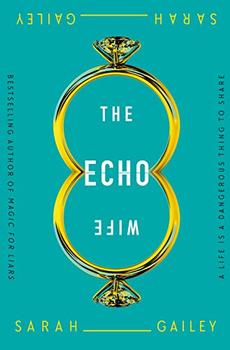Summary | Excerpt | Reading Guide | Reviews | Beyond the book | Read-Alikes | Genres & Themes | Author Bio

1Q84 opens with the heroine stuck in a taxi on an expressway, halted by a traffic jam. To get to an important appointment, she follows the driver's suggestion and leaves the cab to reach a nearby subway station on foot. As she exits, he tells her, "...[Y]ou're about to do something out of the ordinary... and after you do something like that, the everyday look of things might seem to change a little... But don't let appearances fool you. There's always only one reality." That ominous sentence is Murakami's way of saying to his readers, "Buckle up! It's going to be a wild ride!" And the book lives up to this promise as readers are led deeper and deeper into the world of 1Q84, where "the boundary between the real world and the imaginary one has grown obscure."
I've been asked by many, "What's 1Q84 about?" Unfortunately it's nearly impossible to answer that question, and any attempt to do so would only introduce plot spoilers. The book's title might lead one to believe it has some basis in Orwell's novel 1984, but there's almost no parallel and Murakami makes no attempt to establish one. I've heard 1Q84 referred to as "dystopian," but I would disagree with that assessment. There's really not much difference on the surface between the world of 1Q84 and 1984 Japan, and 1Q84 is no more or less pleasant of a place in which to live. 1Q84 is pure Murakami, and as such, defies easy categorization. The story is completely fresh and original and nothing short of a remarkable feat of imagination. The author doesn't just introduce plot twists; his scenarios come out of the blue, constantly surprising his readers and making the story utterly unpredictable. That's not to say that these narrative elements are nonsensical or cause confusion, they're just, well, shocking.
In many ways 1Q84 is classic Murakami; the recurring theme of loneliness, his use of Western music and literature as plot devices, the very detailed descriptions and his complex storylines are all incorporated in the novel. His earlier books have been criticized for flat characterization, but I think that he overcomes that limitation here, creating sympathetic characters of some depth in Aomame, Tengo, and others who appear in the narrative.
As with other Murakami novels, 1Q84 will most likely have a limited audience; if you've tried this author before and haven't liked his work, you probably won't like this one either. First, it certainly falls squarely in the magical realism genre, and that in itself is a turn-off for many. This is one book that will frustrate those who want everything to make sense and to be neatly wrapped up by its conclusion; it must be approached with abandon, and readers will need to resign themselves to not overthink it. Consequently, linear thinkers should give this one a pass. But of more concern is the book's pacing. It's very repetitive, and while some of this may be due to its originally being published in three separate volumes, certainly much of it is simply Murakami's style. The minute detail with which he embellishes every scene and action slows the plot considerably, and there are huge sections that just creep along with very little happening, making one feel that it would have been a better 600-page book than one that's over 900 pages. The dialog is also rather stilted and unnatural, although I'm not sure if that's a stylistic choice or a translation issue.
Murakami fans will be absolutely delighted with 1Q84, and I suspect that those readers new to the author who appreciate non-traditional stories and who have the patience to plow through the slow sections will put it at the top of their all-time favorites list. The plot is so unusual, so unlike most of what is currently hitting the shelves that many will ultimately find the novel a joy - and one that will linger in the mind long after the final page is turned.
![]() This review was originally published in The BookBrowse Review in November 2011, and has been updated for the
January 2013 edition.
Click here to go to this issue.
This review was originally published in The BookBrowse Review in November 2011, and has been updated for the
January 2013 edition.
Click here to go to this issue.

If you liked 1Q84, try these:

by Anthony Doerr
Published 2022
From the Pulitzer Prize-winning author of All the Light We Cannot See, perhaps the most bestselling and beloved literary fiction of our time, comes a triumph of imagination and compassion, a soaring novel about children on the cusp of adulthood in a broken world, who find resilience, hope, and story.

by Sarah Gailey
Published 2022
I'm embarrassed, still, by how long it took me to notice. Everything was right there in the open, right there in front of me, but it still took me so long to see the person I had married.
No pleasure is worth giving up for the sake of two more years in a geriatric home.
Click Here to find out who said this, as well as discovering other famous literary quotes!
Your guide toexceptional books
BookBrowse seeks out and recommends the best in contemporary fiction and nonfiction—books that not only engage and entertain but also deepen our understanding of ourselves and the world around us.